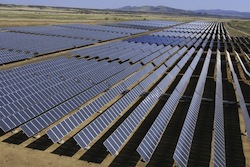Sharp Electronic Corporation is growing it’s presence in the U.S. solar market. Last week, the company announced that it has acquired San Francisco-based Recurrent Energy. Recurrent Energy develops and markets solar-based power generation projects and has a multitude of projects underway with utilities in both the U.S. and around the world. The acquisition was a strategic move by the company to expand its solar business from just production of solar panels to that of a power company’s partner in renewable energy projects.
In a company statement, Sharp said of the deal, “It is essential for Sharp to function as a developer in the photovoltaic field, in order to further expand its business in this area.”
 In addition, it was just announced that Sharp has won a contract to provide 45 MW for the largest solar photovoltaic project ever to be built in not only California, but the world – known as Avenal. The project consists of three sub-projects, Avenal Park, Sun City and Sand Drag, that will all be built in Kings County, Cali.
In addition, it was just announced that Sharp has won a contract to provide 45 MW for the largest solar photovoltaic project ever to be built in not only California, but the world – known as Avenal. The project consists of three sub-projects, Avenal Park, Sun City and Sand Drag, that will all be built in Kings County, Cali.
“This project is one of the largest solar power installations in the world, and one of the largest Sharp has supplied to date. It also marks a significant step forward for California’s renewable energy efforts and we are proud that our cutting edge thin-film modules will help deliver clean power to the residents of California,” said Eric Hafter, senior vice president for the Sharp Solar Energy Solutions Group. “Together with Eurus Energy America and NRG Solar, we are turning land that once used photosynthesis to convert the sun’s rays to produce food for our communities into a farm that uses photovoltaics to convert the sun’s rays into clean energy for the same communities.”
According to a company press release, the Sharp thin-film solar panels utilized for the project feature Sharp’s tandem-junction design that captures a wider part of the solar spectrum and will be manufactured in the Sharp plant in Sakai City, Osaka Prefecture, Japan. Thin-film solar cells used in the panels have a structure in which thin layers of silicon are deposited onto a glass substrate, enabling a dramatic reduction in the amount of silicon used. The production processes are simpler, thereby lowering production costs.
The Avenal solar project will begin construction immediately and should be in full operation sometime in 2011.

